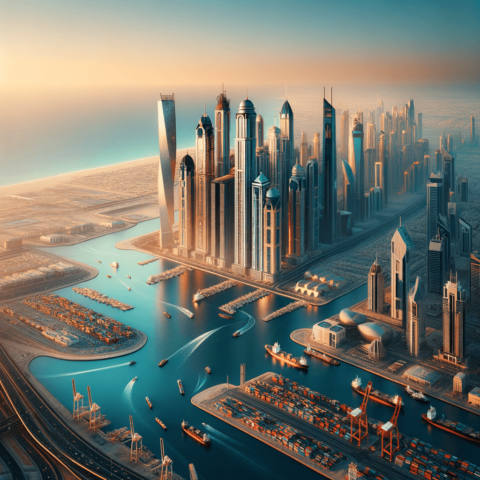
Sharjah EPAA Arrests and Fines Kalba Poachers
May 22, 2024
Hamdan bin Mohammed Launches Ambitious ‘One Million Prompters’ Initiative in Dubai
May 23, 2024The UAE, particularly Dubai, has solidified its rank as a global trading giant, securing the second spot in the Commodity Trade Index 2024. This achievement highlights the nation’s strategic advantages and robust trade infrastructure.
The UAE’s Ascendancy in Global Trade
The UAE’s ascendancy in global trade is underpinned by a rich historical and economic context. Leveraging its strategic location at the crossroads of Europe, Asia, and Africa, the UAE has become a pivotal trading hub, fostering connections that span the globe. The discovery of oil in the mid-20th century was a watershed moment, fueling rapid development and providing both the financial means and the impetus to diversify its economy.
As the UAE sought to reduce its reliance on oil, it invested substantially in infrastructure and legislation aimed at promoting trade and commerce. A standout initiative in this regard is the establishment of the Dubai Multi Commodities Centre (DMCC) in 2002. The DMCC, offering a specialized free zone for commodity trading, has been instrumental in attracting global businesses, providing them with state-of-the-art facilities and a highly favorable regulatory environment.
The UAE’s political neutrality further enhances its appeal. In a region often fraught with geopolitical tensions, the UAE has maintained a stance of diplomatic balance, ensuring a stable and secure environment for international trade. Coupled with robust trade infrastructure, including world-class ports, airports, and a sophisticated logistics network, the UAE offers a seamless trading experience.
In essence, the UAE’s climb to a top global commodity trading hub has been driven by its advantageous location, rich resource base, and continuous efforts to create a conducive business environment. The DMCC exemplifies these efforts, serving as a catalyst for the nation’s trading prowess, buttressed by political neutrality and cutting-edge infrastructure.
Driving Factors Behind the UAE’s Success
Several factors have propelled the UAE to the upper echelons of the Commodity Trade Index, particularly in the categories of commodity endowment and institutional strength. The UAE’s strategic geographical location continues to be a significant advantage, facilitating robust trade routes between Asia, Europe, and Africa. However, the nation’s high scores in logistics infrastructure, favorable tax regimes, and business-conducive policies are equally vital.
Firstly, the UAE’s investment in state-of-the-art logistics infrastructure is unparalleled. Dubai’s Jebel Ali Port, one of the busiest ports globally, and Al Maktoum International Airport create seamless intermodal connectivity. This sophisticated infrastructure enables swift and efficient movement of goods, reducing transit times and costs for traders and investors. For instance, the Dubai Logistics Corridor integrates airport and seaport operations, providing an integrated supply chain ecosystem that handles over 60 million tons of cargo annually.
Secondly, the UAE’s tax policies further amplify its appeal. Corporate tax rates in the UAE are strikingly low, and many Free Zones offer zero percent corporate and personal tax rates. These zones, such as the Dubai Multi Commodities Centre (DMCC), provide an attractive haven for international traders, enabling them to maximize profits while minimizing tax liabilities. The DMCC, with its commodity-specific ecosystem, has become home to over 17,000 companies, bolstering the UAE’s status as a premier trading hub.
Moreover, the UAE’s business-friendly regulatory environment underscores its institutional strength. Streamlined processes for starting businesses, coupled with transparent regulatory frameworks, lower barriers to entry for foreign investors. For example, recent reforms under the UAE’s Commercial Companies Law now permit 100% foreign ownership in mainland companies, a significant shift from previous limitations.
Collectively, these factors create a potent mix that continues to draw global commodity traders and investors, solidifying the UAE’s competitive edge in the global market. This chapter, while focusing on the infrastructural and institutional factors, sets the stage for a comparative analysis in the succeeding section, where the strengths and gaps of other leading trading hubs will be scrutinized.
Comparative Insights from the Commodity Trade Index 2024
Comparative Insights from the Commodity Trade Index 2024: The UAE’s performance as a leading global trading hub is commendable, and a comparative analysis with other top-ranking hubs such as the United States and Switzerland provides deeper insights. The UAE is highly rated in terms of commodity endowment and institutional strength, contributing to its robust performance. The United States, with its colossal economy, boasts unparalleled market depth, advanced financial infrastructure, and stringent regulatory framework. However, its strengths are often overshadowed by complex regulatory requirements and occasional political gridlock.
Switzerland, renowned for its stability and expertise in commodity trading, benefits from a strategic location in Europe, facilitating easy access to EU markets. Its financial institutions are among the most reliable and efficient globally. However, high operational costs and stringent environmental regulations pose challenges to Switzerland’s trading environment.
The UAE leverages its strategic geographical position between East and West, coupled with a business-friendly environment and superior logistics infrastructure. Nevertheless, it faces geopolitical risks and potential economic vulnerabilities from fluctuating oil prices, unlike the more diversified economies of the US and Switzerland.
Geopolitical tensions and macroeconomic conditions will continue to shape the dynamics of these hubs. Trade policies, sanctions, and geopolitical alliances influence the US market heavily. Switzerland, while neutral, must navigate EU regulations and trade policies. The UAE’s proactive diplomacy mitigates some geopolitical risks, but regional instability remains a concern.
With these factors in play, each hub must adapt strategically to maintain and enhance its position in the global commodity trading arena.
The Future of Trade: Key Trends and Predictions
The Future of Trade: Key Trends and Predictions
In an era of ever-evolving global trade, the Future of Trade 2024 report highlights significant trends set to redefine the landscape. Key among these is regionalisation, where trade blocs are becoming more self-reliant, focusing on nearby markets rather than distant ones. This shift stems from geopolitical instability and the desire to mitigate risks associated with long supply chains.
Moreover, supply chain restructuring is paramount. Companies are diversifying their supply sources to avoid over-dependence on any single region. This strategic move aims to increase resilience and agility in face of disruptions like pandemics or trade wars. Notably, the UAE’s strategic location and robust infrastructure make it an ideal hub for companies seeking to establish diversified and resilient supply chains that reach into Asia, Europe, and Africa.
The rise of digital and AI-driven services is also expected to revolutionise trade. Predictive analytics, blockchain, and IoT are bringing unprecedented transparency and efficiency to trading operations. The UAE has been quick to adopt these technologies, fostering a digital ecosystem that supports seamless, secure, and efficient trading activities. The integration of AI in trade logistics, for example, is set to optimise routing and inventory management, reducing costs, and improving delivery times.
As the UAE continues to leverage its strategic advantages and forward-looking policies, it is well-positioned to adapt to these emerging trends. By embracing regionalisation, supply chain restructuring, and digital innovations, the UAE cements itself as a resilient and dynamic player in the modern global trade arena, ready to tackle future challenges head-on.
Dubai: The Ultimate Destination for Tourists and Investors
Dubai Shines as a Leading Global Commodity Trading Hub, The UAE cements its position among the top three in a competitive global market.
Dubai: The Ultimate Destination for Tourists and Investors
Dubai’s rapid ascent as a premier global city is a testament to its world-class infrastructure and visionary leadership. The city’s iconic skyline, dominated by architectural marvels like the Burj Khalifa, the tallest building in the world, serves not just as a tourist magnet but also a symbol of innovation and progress.
For tourists, Dubai offers a rich tapestry of experiences. From the luxurious shopping avenues of The Dubai Mall to the cultural charm of the historic Al Fahidi Neighborhood, there is something for everyone. Families can relish a fun-filled day at IMG Worlds of Adventure or take to the slopes at Ski Dubai, an indoor winter wonderland located in the heart of the desert. Culinary enthusiasts are spoiled for choice, with an array of dining options spanning traditional Emirati cuisine to Michelin-starred restaurants helmed by the world’s top chefs.
For business investors, Dubai presents a plethora of opportunities. The city is home to several free zones, such as the Dubai Multi Commodities Centre (DMCC) and Dubai Internet City, offering tax benefits and full foreign ownership. Additionally, Dubai’s strategic location provides seamless connectivity to markets in Europe, Asia, and Africa, further bolstering its appeal as a global business hub.
The government’s commitment to fostering sustainable growth and innovation is evident in initiatives like the Dubai 2040 Urban Master Plan, which focuses on sustainable urban development, and the Dubai Future Foundation, promoting technological advancement and entrepreneurial ventures. These initiatives ensure that the city continues to thrive, adapting to new trends and driving economic diversification.
Dubai’s promise of a secure, business-friendly environment, coupled with its luxurious lifestyle offerings, make it a prime destination for both tourists and investors looking to be a part of its vibrant future.
Conclusions
Dubai’s prominence in global commodity trading underscores its strategic location, robust infrastructure, and forward-thinking policies. As global trade evolves, Dubai remains a beacon of opportunity, attracting businesses and tourists alike with its dynamic environment and investment-friendly climate.





